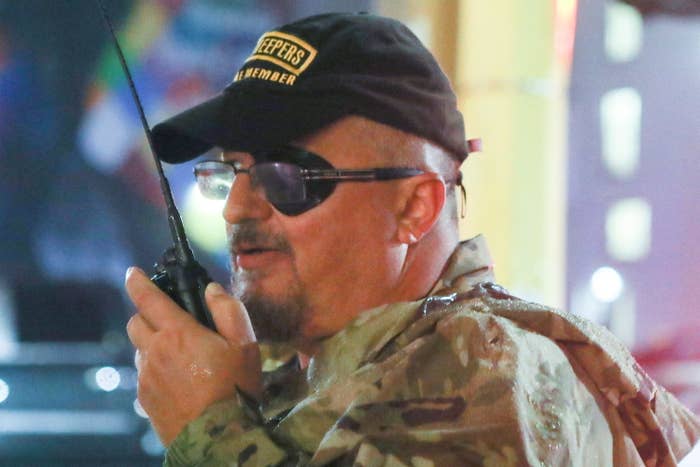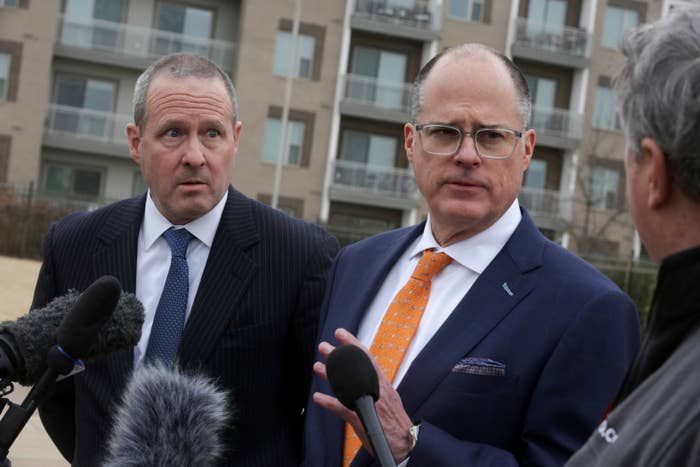
A federal judge has shot down a second attempt by the founder of the militant group the Oath Keepers to win release from jail as he awaits trial for his role in the Jan. 6 riot.
Stewart Rhodes was charged last month with seditious conspiracy, among a host of other alleged crimes, and has been in detention outside of Dallas since his arrest by the FBI. Three weeks ago, a federal magistrate judge in Texas ruled to keep Rhodes behind bars on grounds that he had a “propensity towards violence” and was a flight risk. His attorneys challenged that decision, asking US District Judge Amit Mehta to reverse it.
Mehta, based in Washington, is overseeing the sedition case against Rhodes and 10 other defendants, as well as separate cases against eight other members and associates of the Oath Keepers armed extremist group. In his ruling denying bond Friday afternoon, which was delayed several hours after a power outage in the detention center where Rhodes has been held, he said that there was "no combination of conditions that would ensure the safety of the community” if Rhodes were to be released.
As a result, Rhodes, 56, will remain in custody at least until trial, which is slated to begin July 11. He has requested to remain in a detention center in Oklahoma rather than be transported to Washington, DC, where four other Oath Keepers defendants — Jessica Watkins, Kelly Meggs, Kenneth Harrelson, and Edward Vallejo — are also detained. Prosecutors said on Friday they did not object to him remaining where he is. The judge said he would consider the question because he didn’t want to give Rhodes “special treatment.”
An additional 14 people charged in Oath Keepers cases have been granted bond and have been released as they await trial.
The seditious conspiracy case against Rhodes, which also includes a variety of other conspiracy and obstruction charges, is by almost any measure the most prominent to have come out of the sprawling Jan. 6 investigation. It in many ways encapsulates the Justice Department’s most complete argument that the Capitol riot was a deliberate and premeditated attempt to overthrow a democratically elected government by any means, including violence.
And Rhodes, whom prosecutors say “spearheaded” the conspiracy, is one of the most important defendants among the more than 740 people who have been charged over the past 13 months. An Army veteran who went on to Yale law school only to be disbarred for ignoring court orders and abandoning clients, he has bootstrapped himself to national prominence since founding the Oath Keepers in 2009.
Prosecutors describe him as a dangerous man who plotted over a period of months to halt the certification of the presidential election by rallying a large group of Oath Keepers and associates to Washington, DC, ahead of the Jan. 6 insurrection. They say that by using encrypted messages, he encouraged members of his group to bring weapons to stow outside city limits in Virginia, that he bought weapons himself in the days leading up to the event, and that he subsequently deleted evidence of his involvement.
His lawyers, however, contend that “there is a severe lack of compelling evidence of Rhodes’s leadership of any alleged conspiracy” and that his actions on that day reflect his “loyalty to an oath taken in defense of the Country.” They note that while many members of the Oath Keepers entered the Capitol building, he did not, and that he never summoned the heavily armed “Quick Reaction Force” he had stationed across the Potomac.
During a hearing Wednesday to air arguments about whether he should remain behind bars, Rhodes repeatedly interjected, at times talking over and directing his own lawyers, and offered to testify on his own behalf. It’s unusual for defendants to speak during such proceedings, and his comments prompted Judge Mehta to advise Rhodes to refrain from taking the stand, since he’d be subject to cross-examination from prosecutors. To his own counsel’s apparent relief, he did not ultimately testify, nor did another person who attended the hearing by video: Michael Greene, also known as Michael Simmons, who served as the Oath Keepers’ “operations leader” on Jan. 6.
Rhodes’ lawyers said Greene could dispel a key government claim: that during a Jan. 6 phone call with Kelly Meggs, a fellow member of the Oath Keepers, Rhodes specifically ordered him to enter the Capitol. Greene, the attorneys claimed, was also on that call and would say that no such command was given. Although Mehta never called on him, his presence as a potential witness on Rhodes’ behalf appeared to put to bed speculation that Greene — who has not been charged — could be cooperating with the government.
Mehta, meanwhile, focused on Rhodes’ decision not to call the Quick Reaction Force across the Potomac on Jan. 6. According to Assistant US Attorney Kathryn Rakoczy, the backup firepower didn’t turn out to be necessary because the Oath Keepers, along with the thousands of others in the mob that day, were able to breach the Capitol without needing guns.
Rhodes’ attorneys, James Lee Bright and Phillip Linder, offered a different reason: He had been expecting President Donald Trump to invoke the Insurrection Act, they said, which he believed would have allowed the team waiting in Virginia to ignore the District of Columbia’s strict firearms laws and enter the city. Because the president did not invoke the Insurrection Act, they claimed, the force was not summoned.

In addition to the sedition case against Rhodes and ten other defendants, the Justice Department is pursuing a second case against seven other Oath Keepers, who are charged with conspiring to obstruct Congress, among other charges. The trial in that case is scheduled to begin on April 19, but earlier this week prosecutors and defense attorneys jointly requested a delay because of the huge volume of evidence, some of which is still being processed. Mehta, who has pushed hard to keep the trial date, has not yet ruled on the motion.
Meanwhile, another Oath Keepers defendant, Jonathan Walden, filed papers this week indicating that he is in discussions with prosecutors about a possible plea deal. If he were to agree to cooperate, he’d be the fifth member of the group to flip, not counting Jon Schaffer, who pleaded guilty last April to two crimes related to entering the Capitol but does not appear to have coordinated with any of the others on Jan. 6.
Including those who have flipped, nearly two dozen Oath Keepers and close associates of the group have been charged to date for their role in the Capitol riot, far more than any other group, including the Proud Boys.
Although anyone is open to join the Oath Keepers, the group focuses on recruiting active and retired military personnel and law enforcement officers and takes its name from the oath to the US Constitution that those individuals all have sworn. Rhodes, whose given name is Elmer but who is known by his middle name, has become a regular on conservative programs including Infowars and is known for summoning his group’s membership — often wearing tactical gear and carrying long guns — to patrol controversial public events, such as protests and standoffs with federal law enforcement.
In the case of the Capitol riot, Rhodes and his attorneys have claimed that the Oath Keepers were in Washington only to provide security to VIPs including Roger Stone and Ali Alexander and to protect protesters from antifa and Black Lives Matter members, who, they claimed, regularly attack conservative rallies.
Rhodes’ rhetoric, always critical of the government, has escalated significantly in recent years, and in particular in the wake of the 2020 election, which saw then-president Trump defeated by Joe Biden. Within days of the Nov. 3 vote, prosecutors have noted, Rhodes was sending messages to other members of the Oath Keepers, instructing them to “refuse to accept Biden as a legitimate winner” and noting, “We aren’t getting through this without a civil war.”
“Everything I've seen and heard today has convinced me that Mr. Rhodes is a highly sophisticated individual,” Judge Mehta said Wednesday. "There is no way to ensure that he won't engage in dangerous conduct” if released.

